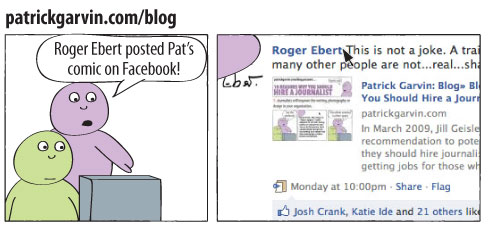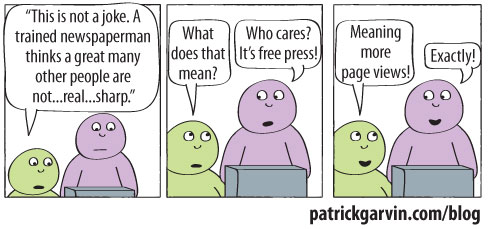In March 2009, Jill Geisler of Poynter wrote an open letter of recommendation to potential employers with 10 reasons why they should hire journalists. Specifically, the letter was aimed at getting jobs for those who had been laid off.
I don’t have to tell you how it hasn’t gotten better for the newspaper industry in the year and a half since that was written. Paper Cuts tracks layoffs, furloughs, cuts, etc., and after a while, they’ve all seemed to blend together.
Thus, I had some motivation to dust off Ms. Geisler’s words and turn them into a web comic. If you were recently laid off, here’s some ammunition to use with your potential new employer. If you’ve got a resume from a former journalist, here’s why you need to hire this person yesterday.
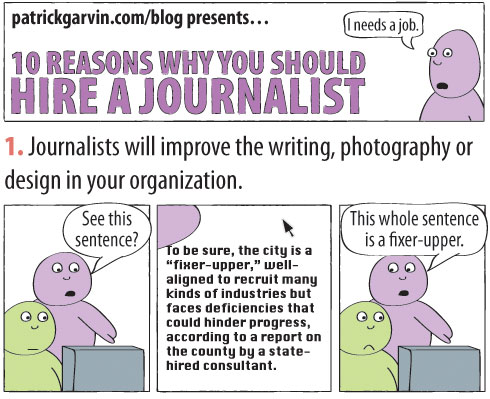
Jill Geisler writes:
When journalists volunteer for church, school or civic organizations, they are inevitably asked to work on communications projects. Their writing is clear and succinct; their photography and design skills make whatever they’re working on look more polished and professional. They’re sticklers about copy editing and will raise the quality of even your internal memos.
Journalists are anal-retentive perfectionists who can’t turn off their brains. Try watching a documentary with a reporter. Show a designer a menu with Comic Sans and count how many seconds it takes her to cut you. Ask a copy editor what his favorite word misuses are. These are people obsessed with quality and correct execution of their crafts.
—-
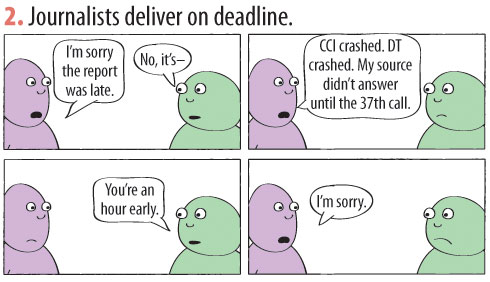
Jill Geisler writes:
Their work lives have been defined by deadlines. Blowing a deadline is a cardinal sin in the newsroom culture. Tell them when something is due and you’ll get it — or you’ll get a bulletproof reason from a nonetheless-contrite employee.
Journalists will eat at their desks – or not eat at all – if they’re worried about a deadline.
—-
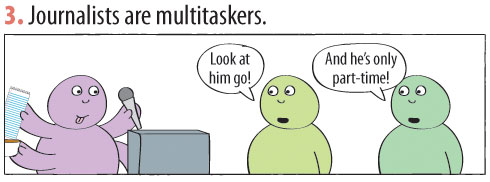
Jill Geisler writes:
In recent years, journalists have been required to do more with less. Reporters and photographers took up videography, editing and blogging. They file stories for print, broadcast and online, some while also tweeting.
And journalists are always working on at least two or three projects, all while having to answer to editors and interview sources.
—-
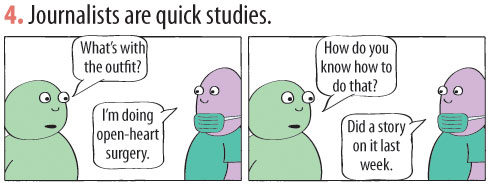
Jill Geisler writes:
Imagine a job in which you have to learn things every day, then turn around and teach those things to others. That’s exactly how I’ve described the challenge and absolute joy of journalism at student career fairs. That skill set demands that journalists take in and process information with extraordinary efficiency and clarity, a benefit in any line of work.
By necessity, journalists have to know at least a little about a lot. They have to take complex tax laws and condense them so that people can process the issues in the time it takes to read 20 inches. And they have to do this while also figuring out how to explain proton therapy, red light cameras and new council regulations. All for stuff due in the next day or two.
—-

Jill Geisler writes:
They’ve been trained that “If your mother says she loves you, check it out.” Journalists know that asking why and why not, looking at multiple perspectives, digging beneath the surface, challenging conventional wisdom, discerning patterns, finding context and thinking about “what’s next” improves any story. Just as it improves job performance in most any field.
Journalists have to call “bullshit” on conventional wisdom. They have to be able to explain every choice they made in their story in case a news editor calls at 10 at night with a question about some quote or arcane piece of legislation.
—-
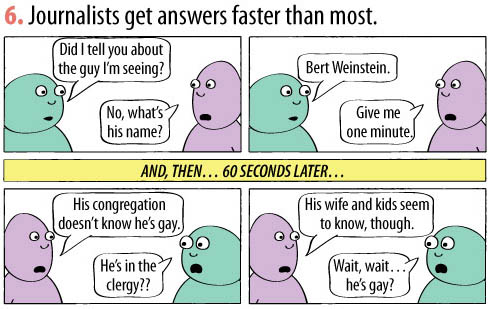
Jill Geisler writes:
Even in social situations, you’ll find friends rely on their journalist buddies to gather information. Scout the restaurant. Get the background on the car I’m thinking of buying. Vet the new school superintendent. Help me find the best doctor for my condition. Journalists know how to do research — fast.
They can Google-stalk potential boyfriends like nobody’s business. Give them a name, and they’ll be able to get you a list of every traffic ticket that person has ever had. By the second date, my friend Joe knew more about his now-husband than Chris probably knew about himself.
—-
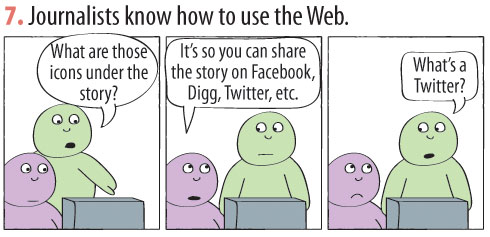
Jill Geisler writes:
Your organization may or may not have embraced all of its online opportunities, but journalists know firsthand why the Internet matters. Sure, some news folks adopted an online mindset more slowly than others, but now many are well-equipped to help you execute online strategies — blogging, creating video and audio, connecting through social networks. They’ve been brought up to speed in the past several years as their newsrooms expanded their horizons.
Remember how we said journalists are multitaskers and quick studies? They’ve had to become web Jedis without the help of a Yoda or Obi-Wan Kenobi. Many of the web skills you’ll see out of these people were gleaned from newsroom experience. These were things they had to learn, whether it be because someone else left, or because they wanted to make themselves indispensable the next time layoffs came around.
—-
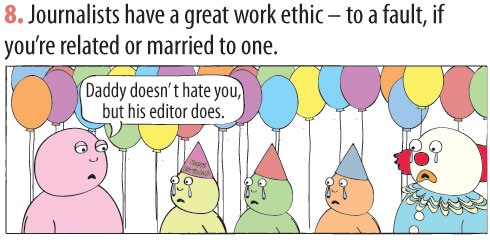
Jill Geisler writes:
If you’ve ever complained that your team has a 9-to-5 approach to the job, hire a journalist. Some may think they’re crazy, but they’ve often followed stories, not schedules. They’ve dropped everything for breaking news. They’ve gotten up in the middle of the night to catch a perfect picture of the moon or listen to a source who could talk only in darkness. They took on the work of laid-off colleagues while still doing their own, for as long as they could. And they still have energy.
I know journalists who’ve canceled vacations because of breaking developments in huge stories. There have been times when I’ve seen editors in a newsroom on every day of their vacation. I’ve seen reporters come in multiple times on weekends, just to double-check things and answer questions for the copy desk.
—-
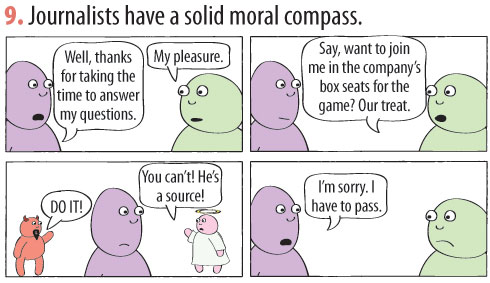
Jill Geisler writes:
Imagine signing on to a job where you promise not to accept gifts that others could, must take pains to avoid real or perceived conflicts of interest, should keep your opinions to yourself, are expected to question authority while respecting the law and to recognize that your work carries the opportunity every day to do good or harm.
Journalists didn’t just sign some statement saying they’ll comply with the organization’s policies, file it and forget it; they chose a profession that embraces a code of ethics and wrestles with its obligations daily. You might think they’ve fallen short over the years. But if you want to ask a great job interview question, ask journalists about some of the ethical minefields they’ve successfully walked and how they made it through while minimizing harm.
You would think you’d get into writing about sports or entertainment to get free perks, but a journalist would rather starve than do something he thinks would compromise his integrity. Some journalists don’t even like accepting a soda from a source.
—-
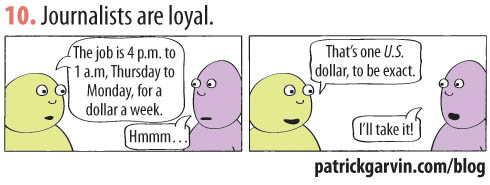 Jill Geisler writes:
Jill Geisler writes:
That’s why they’re hurting right now. The journalists you may hire have been faithful to their vocation, even when the going got more than tough. They’ve adapted, learned new skills, added duties, taken pay cuts and furloughs, mourned the loss of colleagues and coverage, and kept on doing work that mattered. What does that mean to you? Speaking as a management coach, I say it means this: hiring journalists presents you a terrific opportunity. Give them a job they believe in and they’ll work like hell to help you succeed.
Journalists have taken jobs in towns you’ve never heard of just so they could work in newspapers. They have skills applicable to many jobs where they could make much more, but they’ve chosen to stay in journalism, even when it meant working weekends and odd hours. They’ve missed birthdays, weddings and other important milestones because of their devotion to journalism. They’ve lived hundreds of miles away from family and dragged spouses across the country just so they could continue working in journalism. This is not a job, this is not a marriage, and this isn’t even a vocation. To a newsie, journalism is something much bigger than all of that.
—-
UPDATE: Congratulations to Lisa, who found the typo in #6. See, everyone needs a copy editor.
———
RELATED:
Web Comic: The conversation many journalists hate having with strangers

